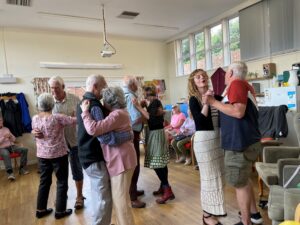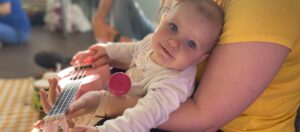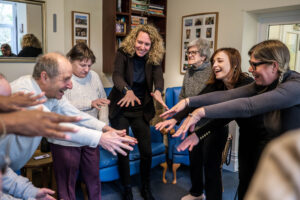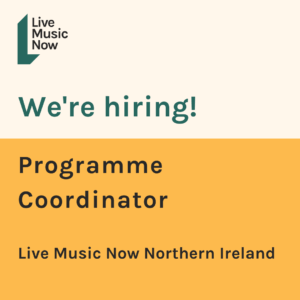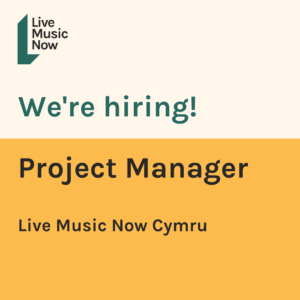Classical soprano, Mimi Doulton, joined Live Music Now’s South East branch in late 2019. She writes about her Covid-19 experience in her pandemic diary entry below.

Mimi Doulton as Mabel in The Pirates of Penzance, with Gareth Edmunds, March 2019 (c) Robert Workman & Lapak in
The Cunning Little Vixen, with Caroline Taylor, March 2020
Early March 2020: Covid-19 is ravaging Italy but life in the UK continues much as normal. I am in rehearsal for two operas: Benjamin Britten’s The Rape of Lucretia and Leos Janacek’s The Cunning Little Vixen. On the 7th of March I take a weekend off from rehearsals to fly to Sweden for an audition. The plane is fairly empty, but other than that there is little sign of any pandemic.
In just three days I lose £5,000 worth of work.
On Monday I return to rehearsals – The Cunning Little Vixen is due to open on Saturday 14th March, and The Rape of Lucretia a week later. In between this I am fitting in meetings for my two part-time administrative roles with charities, and preparing for my first ever Live Music Now concert in early April. However, by Wednesday the first cancellations are starting to drift into my inbox, and by Friday it is an avalanche. In just three days I lose £5,000 worth of work. Somehow we manage to perform The Cunning Little Vixen at the Barnes Music Festival, but to a reduced audience as people are starting to voluntarily stay at home. On Sunday I drive to St Albans in the driving rain for a rehearsal… I get home that evening and start feeling a little under the weather.
16th March 2020: Boris Johnson orders theatres and concert halls to close their doors. I am in bed with a raging fever and cough, but not ill enough to qualify for a Covid test. I have emailed my colleagues to ask them to self-isolate. The week passes by in a blur. More cancellations come in and I am vaguely aware of what is going on in the news. By the time I recover the UK is in full lockdown.
Spring 2020: The beginning of lockdown is quite enjoyable. I have been working at 150 miles an hour and this is a welcome opportunity to have a rest, practice, and enjoy time with my family. Companies have been generous with cancellation fees and everyone seems fairly confident that we will be back to normal by the autumn. I am lucky to be living with my parents, and to have my administrative work to tide me over in the meantime. I decide to put my free time to good use by doing shopping for a few neighbours, and spend a lot of time queuing for Tesco.
By May I am feeling the stretch financially and decide to start teaching English online. I meet a fantastic range of people who I would never have encountered pre-pandemic: a meat packer from Lithuania, a care worker from Italy, someone from Brazil who designs gambling software. I pick up other odd jobs along the way including gardening and web design. I am also lucky to receive financial support from the government’s SEISS scheme. But all around me I see freelancer colleagues suffering. People who have been excluded from or received reduced SEISS because they were studying, because they earned £1 over the threshold, or because they took maternity leave in the previous three years. I decide to start campaigning and am invited to join the Freelance Taskforce – a group of freelancers sponsored by organisations to campaign for the rights of freelancers during and post pandemic.
I gather over one hundred people’s stories, each one devastating in its own way.
My first big project is to make the case to Arts Council England to support freelancers where the government is falling short. I gather over one hundred people’s stories, each one devastating in its own way. Not just careers – but lives and families – ruined by the pandemic. It is emotionally exhausting, but also energising to be part of the effort to change things. Although ACE do not manage to offer specifically targeted support for freelancers ineligible for SEISS, they do start prioritising the applications of freelancers for funding. It takes another year for the government to listen and make some small concessions.
Pre-lockdown my nerves had always manifested themselves as butterflies in my stomach – this is the first time they have caused vocal issues.
Summer 2020: In late summer I receive my first opportunity to return to work – recording a new piece by Ninfea Crutwell-Reade at the Presteigne Festival, with a planned performance in the autumn. We rehearse and record in masks, which are still something of a novelty! I spend the days leading up to it expecting an ecstatic return to work, but wake up on the morning of the recording with no voice and terrible nerves. The following months bring a series of weddings and funerals as well as a couple of live-streams. Every time I go through the same routine of waking up missing some or all of my voice on the day of a performance. It is incredibly distressing after months of forced silence.
I talk to many kind friends and colleagues about my fears. Pre-lockdown my nerves had always manifested themselves as butterflies in my stomach – this is the first time they have caused vocal issues. It is not until September that the clouds finally part and I wake up with that comforting feeling of butterflies in my stomach and no vocal problems to be seen. It is such a relief to finally be able to enjoy the warmth of an audience.
 Red House, Aldeburgh
Red House, Aldeburgh
However, the true blessing of the summer is a Wild Plum Arts residency at the Red House in Aldeburgh. Five days with the sound-artist Jonathan Higgins creating a piece that has been in the planning for three years. We are working in beautiful surroundings, with excellent food provided by the incredibly generous Lucy Schaufer and Chris Gillett. It is an oasis in the desert of 2020.

‘Disruptions: Man in Regent Street’ by Jonathan Higgins.
A long, dark autumn and winter follows living alone in a new country, with little opportunity to socialise, let alone try and network.
Autumn 2020: In the autumn I make the decision to pack my bags and move to Stuttgart for six months. The clock is ticking on Brexit and I want to secure residency while I assess whether there are enough employment opportunities in Germany for it to be worth my staying. Six months seems like a realistic amount of time to explore the German music scene.
The second wave draws nearer. But we are still blissfully oblivious, and I fly back to England for a production of a new opera by the composer Tom Smail, based on Alba Arikha’s memoir Major/Minor. A few days after closing the UK goes back into lockdown and I return to Germany where I test positive for Covid-19 (thankfully symptom-free this time). A long, dark autumn and winter follows living alone in a new country, with little opportunity to socialise, let alone try and network. It is the greatest challenge of the pandemic so far.
Spring 2021: A year into the pandemic and six months into my time in Germany. I make the decision to stay a bit longer as the chances to explore have been so few and far between. But first, the UK beckons for three weeks of concerts. It is a joyous time, with none of the anxiety of returning to performance that I experienced in 2020.
What is certain is that we are not ‘going back to normal’, but going forward to a world in need of healing…
I am writing this blog now in the early summer – 15 months after the pandemic changed all our lives. In many ways the future looks more uncertain than it did this time last year. Whilst last June we were still hoping to be back to ‘normal’ by September, this June we are seeing the power of new variants to wreak havoc in an instant, and the words ‘nobody is safe until we are all safe’ ring very true. What is certain is that we are not ‘going back to normal’, but going forward to a world in need of healing – going forward to a place where schemes like Live Music Now are needed more than ever before. I cannot wait to get back into settings next week and let the healing begin.
